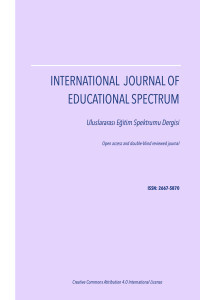An Investigation into Artificial Intelligence (AI) in the English as a Foreign Language (EFL) Context
An Investigation into Artificial Intelligence (AI) in the English as a Foreign Language (EFL) Context
Bibliometrics, Web of Science (WoS), Artificial Intelligence Teaching English as a Second Language, Machine learning,
___
- Aria, M., & Cucurullo, F. (2017). Bibliometrix: An R-tool for comprehensive science mapping analysis. Journal of Informetrics, 11(4), 959-975. https://doi.org/10.1016/j.joi.2017.08.007
- Ateş, S. (2019). The Impact of the Emotional Intelligence of Learners of Turkish as a Foreign Language on Reading Comprehension Skills and Reading Anxiety. Universal Journal of Educational Research, 7(2), 230-238. https://doi.org/10.13189/ujer.2019.070230
- Bailin, A. (1987). Artificial intelligence and computer-assisted language instruction: A perspective. CALICO Journal, 5(3), 25–45. https://doi.org/10.1558/cj.v5i3.25-45
- Borgman, C. L. (1989). All users of information retrieval systems are not created equal: An exploration into individual differences. Information Processing & Management, 25(3), 237-251. https://doi.org/10.1016/0306-4573(89)90033-5
- Cheng, S.-M., & Day, M.-Y. (2014). Technologies and Applications of Artificial Intelligence: 19th International Conference, TAAI 2014, Taipei, Taiwan, November 21-23, 2014, Proceedings. Springer.
- Cooper, H. M. (2015). Research synthesis and meta-analysis: A step-by-step approach. Sage publications.
- Ghoneim, A., & Elghotmy, A. (2021). Using an Artificial Intelligence Based Program to Enhance Primary Stage Pupils' EFL Listening Skills. Journal of Education and Social Sciences, 16(1), 1-8. https://doi.org/10.21608/edusohag.2021.140694
- Karsenti, T. (2019). Artificial intelligence in education: The urgent need to prepare teachers for tomorrow‟s schools. Formation et Profession, 27(1), 105. https://doi.org/10.18162/fp.2019.a166
- Li, J., Wang, Y., & Li, Y. (2020). The Effect of AI-Based Chatbots on EFL Speaking Practice. Journal of Educational Technology Development and Exchange, 13(1), 1-14.
- Li, Y., Wang, Y., & Li, J. (2021). An AI-Based Adaptive Learning System for EFL Vocabulary Learning. Journal of Educational Technology Development and Exchange, 14(1), 1-14.
- Liu, Y., Li, Y., & Wang, Y. (2020). Developing an AI-Based Speaking Assessment System for EFL Learners. Journal of Educational Technology Development and Exchange, 13(2), 1-14.
- Luckin, R., Holmes, W., Griffiths, M., & Forcier, L. B. (2016). Intelligence unleashed: An argument for AI in education. Pearson. http://discovery.ucl.ac.uk/1475756/ Rich, E. (1983). Artificial intelligence. McGraw-Hill. Matthews, C. (1993). Grammar frameworks in intelligent call. CALICO Journal, 11(1), 5–27. https://doi.org/10.1558/cj.v11i1.5-27.
- McBurney, M. K., & Novak, P. L. (2002, September). What is bibliometrics and why should you care?. In Proceedings. IEEE international professional communication conference (pp. 108-114). IEEE.
- Mehrotra, D. D. (2019). BASICS OF ARTIFICIAL INTELLIGENCE & MACHINE LEARNING. Notion Press.
- Nilsson, N. J. (2011). The quest for artificial intelligence: A history of ideas and achievements. Cambridge University Press. https://doi.org/10.1017/CBO9780511819346
- Kurzweil, R. (1990). The age of intelligent machines. MIT Press.
- Niu, B., Hu, Y., & Li, X. (2016). Global Research on Artificial Intelligence from 1990–2014: Spatially-Explicit Bibliometric Analysis. ISPRS International Journal of Geo-Information, 5(5), 66. https://doi.org/10.3390/ijgi5050066
- Pech, G., & Delgado, C. (2020). Assessing the publication impact using citation data from both Scopus and WoS databases: an approach validated in 15 research fields. Scientometrics, 125(2), 909-924.
- Rahman, S., Mahbubur. (2009). Methods and Applications for Advancing Distance Education Technologies: International Issues and Solutions: International Issues and Solutions. IGI Global.
- Ruiz-Real, J. L., López-Cózar, E. D., & Herrera-Viedma, E. (2020). Artificial intelligence in business and economics research: Trends and future. Journal of Business Economics and Management, 21(6), 1364-1385. https://doi.org/10.3846/jbem.2020.13641
- Stone, P., Brooks, R., Brynjolfsson, E., Calo, R., Etzioni, O., Hager, G., Hirschberg, J., Kalyanakrishnan, S., Kamar, E., Kraus, S., Leyton-Brown, K., Parkes, D., Press, W., Saxenian, A., Shah, J., Tambe, M., & Teller, A. (2016). “Artificial intelligence and life in 2030.” One hundred year study on artificial intelligence: Report of the 2015- 2016 study panel. https://ai100.stanford.edu/2016-report
- Wang, R. (2019). Research on Artificial Intelligence Promoting English Learning Change. Proceedings of the 3rd International Conference on Economics and Management, Education, Humanities and Social Sciences (EMEHSS 2019). Proceedings of the 3rd International Conference on Economics and Management, Education, Humanities and Social Sciences (EMEHSS 2019), Suzhou City, China. https://doi.org/10.2991/emehss-19.2019.79
- Wang, Y., Li, J., & Li, Y. (2021). The Effectiveness of AI-Based Writing Feedback on EFL Learners' Writing Performance. Journal of Educational Technology Development and Exchange, 14(2), 1-14.
- Whitby, B. (2009). Artificial Intelligence. The Rosen Publishing Group, Inc.
- Zhang, Y., Wang, Y., & Li, Y. (2019). Developing an AI-Based Automated Scoring System for EFL Writing Assessment. Journal of Educational Technology Development and Exchange, 12(2), 1-14.
- ISSN: 2667-5870
- Yayın Aralığı: Yılda 2 Sayı
- Başlangıç: 2019
- Yayıncı: Hakan ULUM
Development of Attitude Scale Towards the Use of Technology in Primary School Science Course
An Investigation into Teaching English to Gifted Individuals: Giving Voice to Turkish EFL Teachers
Biyoloji Öğretiminde Gerekli Görülen Öğretim Stratejilerinin Belirlenmesi
Yüksek Öğretimde Çevrimiçi Öğrenci Katılımı: Bölüm 2 – Pratik
Yüksek Öğretimde Çevrimiçi Öğrenci Katılımı: Bölüm 1 – Teori
Stress Experienced by Special Education Teachers and Coping with Stress
Fulya AKGÜL, İsmail ÇELİK, Özcan İKBAL, Serkan ATİLLA, İbrahim KUZ, Gökmen KEKLİK, Abdullah SADAN
Okula Başlama Yaşı: Okula Başlama Kararında Esnek Bırakılan Üç Ay ve Ötesi
Differential Influence of Demographic Variables on Dyscalculia Dimensions
